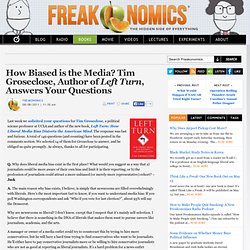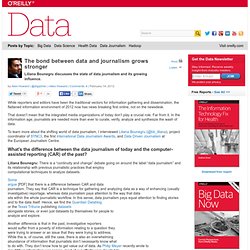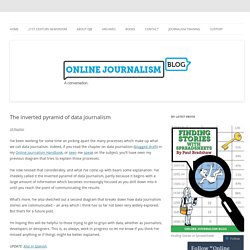

Désintermédiation et perte de pouvoir des journalistes : Crise d. Avec Internet, on s'habitue à accéder à l'information de façon directe, sans l'aide d'intermédiaires.

Le rôle de médiation des journalistes est remis en cause. Ce rôle ne disparait pas: il se modifie. Dans le même temps, d'autres médiateurs apparaissent. Cette désintermédiation est apparue très visible lors de l'émission « Parole de Français », où le président de la République répondait à 11 Français (plus 2 journalistes de TF1).
Avant de se rendre à Davos, le locataire de l'Elysée a participé à l'émission « Paroles de Français ». Cette émission, on peut la voir de deux façon: 1) c'est juste un trompe l'œil, une émission de télé réalité politique, un pseudo échange entre un homme politique et des citoyens triés sur le volet; l'essentiel se passe ailleurs, par exemple au sommet Davos, qui réunit les super riches. How Biased is the Media? Tim Groseclose, Author of Left Turn, Answers Your Questions. Last week we solicited your questions for Tim Groseclose, a political science professor at UCLA and author of the new book, Left Turn: How Liberal Media Bias Distorts the American Mind.

The response was fast and furious. A total of 149 questions (and counting) have been posted in the comments section. We selected 14 of them for Groseclose to answer, and he obliged us quite promptly. As always, thanks to all for participating. Q. A. Why are newsrooms so liberal? A manager or owner of a media outlet could try to counteract this by trying to hire more conservatives, but he will have a hard time trying to find conservatives who want to be journalists.
How can journalists be aware of their own biases? And if a journalist is really serious about understanding his or her own biases, he or she could visit Washington County, Utah. Q. A. Although Republicans and Democrats probably do get their news from vastly different sources, in one sense it hardly matters. Corporate Wars-Alternative News Links. Media Reform Information Center. Avoid Making the First Concession When Bargaining to Come Out Ahead in the End. It's almost common sense, yet Obama still hasn't figured it out. This "common sense" is what led to the budget gridlock and the subsequent debt limit gridlock that both led to two dramatic drops in job growth in the month immediately afterward. Two-sided negotiation is hard (almost impossible) when both sides are populated by people with strong opinions who effectively have veto power over the other side. That's why the most successful negotiations are mediated negotiations, with a non-partisan third party moderating the discussion.
By taking the middle road each time these negotiations have come up, Obama's trying to position himself as that mediator. Unfortunately, the GOP just won't accept him as such. The solution isn't getting rid of Obama. Upon election, Obama and the Dems had control of both House of Congress, and the mandate of a decisive victory in the election. It was like Obama (and the Dems) were afraid to take responsibility for actually trying to change things. The bond between data and journalism grows stronger.
While reporters and editors have been the traditional vectors for information gathering and dissemination, the flattened information environment of 2012 now has news breaking first online, not on the newsdesk.

That doesn’t mean that the integrated media organizations of today don’t play a crucial role. Far from it. In the information age, journalists are needed more than ever to curate, verify, analyze and synthesize the wash of data. To learn more about the shifting world of data journalism, I interviewed Liliana Bounegru (@bb_liliana), project coordinator of SYNC3, the first international Data Journalism Awards, and Data Driven Journalism at the European Journalism Centre.
What’s the difference between the data journalism of today and the computer-assisted reporting (CAR) of the past? Some argue [PDF] that there is a difference between CAR and data journalism. On the other hand, some argue that there is no difference between data journalism and computer-assisted reporting. La cartographie de la blogosphère politique. The inverted pyramid of data journalism. I’ve been working for some time on picking apart the many processes which make up what we call data journalism.

Indeed, if you read the chapter on data journalism (blogged draft) in my Online Journalism Handbook, or seen me speak on the subject, you’ll have seen my previous diagram that tries to explain those processes. I’ve now revised that considerably, and what I’ve come up with bears some explanation. I’ve cheekily called it the inverted pyramid of data journalism, partly because it begins with a large amount of information which becomes increasingly focused as you drill down into it until you reach the point of communicating the results. What’s more, I’ve also sketched out a second diagram that breaks down how data journalism stories are communicated – an area which I think has so far not been very widely explored.
But that’s for a future post.